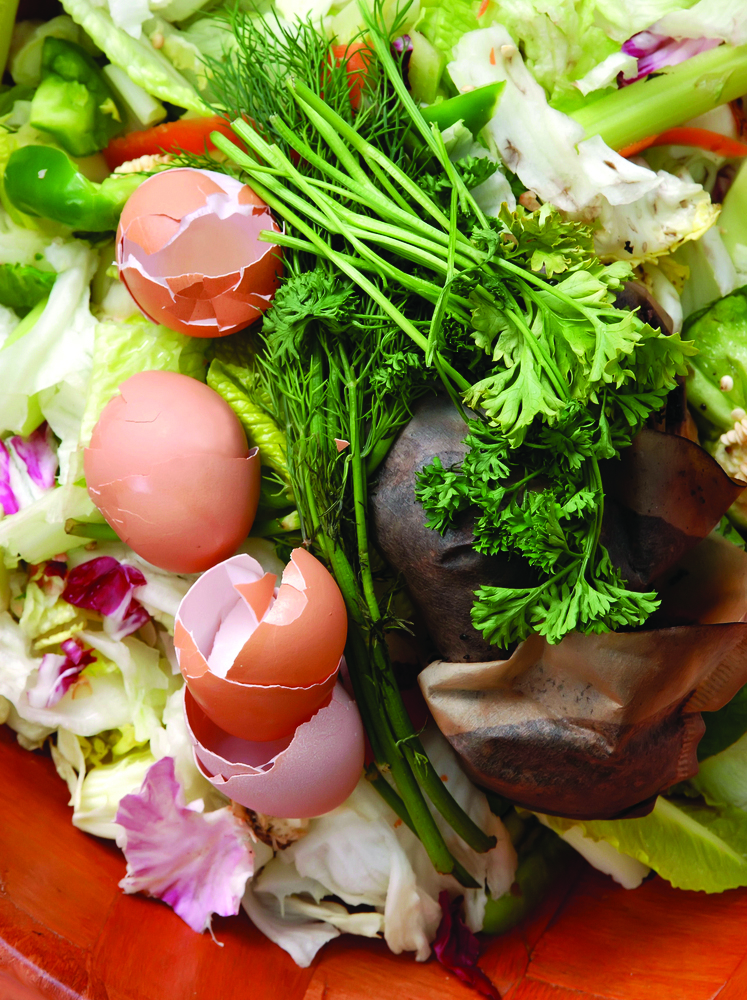 Did you know organic waste comprises about 40 percent of what goes into the average Maine trash can, and about half of that is food waste? That’s nearly a quarter of your trash that could instead be converted into nutrient-dense compost or farm fertilizer. The state has set a goal to recycle half of the waste we generate by 2021. And food waste and scraps, when separated into their own bin, represent one of the greatest modern-day recycling opportunities.
Did you know organic waste comprises about 40 percent of what goes into the average Maine trash can, and about half of that is food waste? That’s nearly a quarter of your trash that could instead be converted into nutrient-dense compost or farm fertilizer. The state has set a goal to recycle half of the waste we generate by 2021. And food waste and scraps, when separated into their own bin, represent one of the greatest modern-day recycling opportunities.
But what to do with those last bites that won’t fit in our tummies, or that broccoli that sat in the fridge a little too long? We have more choices than ever to reinvest food scraps into our soil and plants. Use this guide to navigate and pinpoint the solution that’s best for you.
Your Lifestyle: “The Staycationer”
You have a yard and leaves to rake. You like fresh air, puttering around the back yard, and a little bit of manual labor. You prefer burning calories over fossil fuels by walking your food waste to the compost heap. You and your lot in life (i.e. your backyard) together can transform your coffee grounds, fruit, bread and more into soil for your own homegrown, nutrient-rich edibles.
Best food waste recycling solution:
Backyard Composting – Learn more at:
www.maine.gov/dep/sustainability/compost/index.html
www.eartheasy.com/grow_compost.html
Pros
- Free or very inexpensive
- Readily available
- Under your control
- Family-friendly activity
Cons
- Excludes dairy, meat, oils and fats
- Requires manual labor
- Compost takes longer to break down than in industrial settings
Your Lifestyle: “The Four-Season Dirt Digger”
You like to see things happening right before your eyes. You’re a nurturer and are sensitive to others’ needs. You dig dirt so much that the thought of living beside 500 worms excites you!
Best food waste recycling solution:
Vermicomposting – A compost system of worms that eat your food scraps and leave behind nutrient-rich castings for your garden. Learn more: WormMainea.com
Pros:
- Allows at-home composting year-round
- Cheap to design your own bin system
- Worms constantly eat, yielding soil rich in nitrogen, phosphorous and other nutrients
- Constantly breeding worms can be divided and given away to friends
Cons:
- Dairy, meat, fat or oil risk killing off your worms
- Can’t leave outside for the winter
Your Lifestyle: “The Community Recycler”
Visits to the town transfer station top your list of favorite way to connect with neighbors and friends. You are proud that your recyclables are double (or more) than your trash each week. You would very willingly separate out and recycle your food waste if you had somewhere to bring it.
Best food waste recycling solution:
Transfer Station Drop-off Areas – Inquire with your city/town office to learn more.
Pros:
- Free
- Convenient co-location with recycling & trash
- Composted soil may be available (inquire with your local transfer station)
Cons:
- Odiferous
- Icky to handle
- Available (or in development) in limited number of towns: Bath, Bethel, Cape Elizabeth, Falmouth, Freeport, Greenwood, Hanover, Norway/ South Paris, Mechanic Falls, Mexico, Newry, North Yarmouth, Poland, Rumford, Scarborough, South Portland, Wilton, Woodstock, and Yarmouth
Your Lifestyle: “The Spatially Challenged”
You are an apartment dweller with little to no yard, but a lush deck or windowsill ripe with tomatoes or herbs. Or maybe you have a lovely small garden plot but haven’t the time (or stomach) to feed and turn your own backyard compost.
Best food waste recycling solution:
Subscription-based curbside composting service:
- Garbage to Garden
- WeCompostIt!
- Agri-Cycle Energy (Commercial & Municipal Programs Only)
Pros:
- Can mix food, organic paper products, and compostable utensils
- Filled bin is swapped out with a clean bin weekly
- Convenient curbside pick-up
- Receive composted soil without the labor of making your own
Cons:
- Only offered in select Southern Maine communities
- Costs $9 – $14 per month
- Fossil fuels used to transport food scraps to industrial composter
Your Lifestyle: “The Time-Starved Closed-Looper”
You care about the earth and have been spotted more than once rescuing recyclables from your household trash. You like to see fewer tax dollars spent on trash disposal and more spent on community or environmental programs. You don’t have time to deal with icky food waste but feel guilty putting it in the trash. You want to do the right thing, but your disposable income (and sleep deprivation) compel you to prioritize black fuel (coffee) over black gold (composted soil).
Best food waste recycling solution:
- NEW: Town/city curbside food waste collection. Two pilot communities in Scarborough and South Portland will be the first to test this new ecomaine service. Learn more at ecomaine.org
Pros:
- Food converted into electricity, fertilizer and animal bedding at Exeter Agri-Energy’s anaerobic digester
- De-packager allows food waste to be contained in clear plastic bags
- Fats, oils, meats, dairy and bones / shells allowed
Cons:
- Not yet widely available
- No compost available in exchange for food waste
- Fossil fuels used to transport food scraps to anaerobic digester
By Lisa Wolff, Communications Manager for ecomaine, the nonprofit quasi-governmental provider of sustainable waste management solutions for a third of Maine’s population. Learn more at ecomaine.org.
This article was re-published from Green & Healthy Maine HOMES magazine. Subscribe today!








